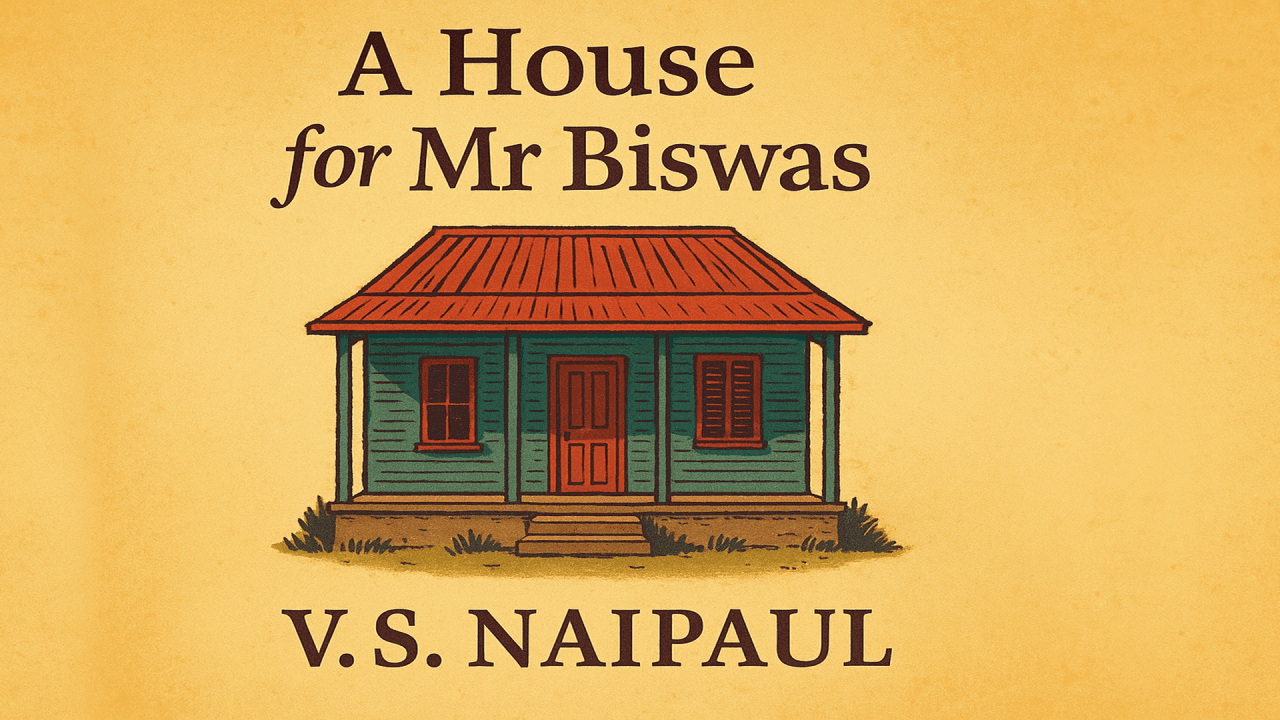V.S. Naipaul’s A House for Mr. Biswas is a deeply affecting tale about one man’s lifelong quest—not for glory, wealth, or power—but simply for a house he can call his own. On the surface, it’s a story of real estate and struggle. But beneath the bricks and bureaucracy lies a moving meditation on self-worth, freedom, and cultural identity.
Set in colonial Trinidad, the novel follows Mohun Biswas, born into misfortune and tethered to a domineering in-law family. What he wants is simple: a house. But in Naipaul’s hands, this humble desire becomes an epic, full of tragicomedy and quiet resilience.
A Masterpiece of Postcolonial Literature
Welcome to this month's edition of Literary Explorations, where we delve into V.S. Naipaul's seminal work, "A House for Mr. Biswas." Published in 1961, this novel is widely regarded as Naipaul's magnum opus and a cornerstone of postcolonial literature.
The Author Behind the Story
Nobel Prize-winning author V.S. Naipaul (1932-2018) drew heavily from his own family history to create this remarkable work. Born in Trinidad to a family of Indian descent, Naipaul crafted a narrative that mirrors his father's struggles and aspirations. Like many of Naipaul's works, "A House for Mr. Biswas" explores the complex intersections of colonial history, cultural displacement, and the search for identity.
The Heart of the Story
The novel chronicles the life of Mohun Biswas, born into inauspicious circumstances in rural Trinidad. From his birth, where a pundit predicts misfortune, to his many failed occupations and his complicated relationship with the domineering Tulsi family after his marriage, Mr. Biswas's story is one of persistent struggle against the forces that threaten to erase his individuality.
Central to the narrative is Mr. Biswas's lifelong quest to own a house—a symbol of independence and self-determination in a world where these qualities are systematically denied to him. His journey through a series of inadequate dwellings reflects his ongoing battle against dependency and subjugation.
Key Characters:
- Mohun Biswas - Our protagonist, whose struggle for dignity and independence forms the heart of the story
- Shama Biswas - Mr. Biswas's wife, who mediates between her husband and her powerful family
- Mrs. Tulsi - The matriarch of the Tulsi family, whose authority Mr. Biswas continuously challenges
- Seth - Mrs. Tulsi's brother-in-law, who helps run the family business and often clashes with Mr. Biswas
Literary Significance & Themes
"A House for Mr. Biswas" resonates deeply with readers for its exploration of universal themes through a distinctly postcolonial lens:
The Quest for Independence
The novel masterfully depicts the human yearning for autonomy. Mr. Biswas's desire for his own house symbolizes his need to establish his identity free from colonial influence and familial domination.
Cultural Displacement
Set against the backdrop of Indian diaspora in the Caribbean, the novel examines the complexities of maintaining cultural identity in a colonial environment. Characters navigate between traditional Hindu practices and Western influences, creating a unique cultural hybrid.
Family Dynamics
The tense relationship between Mr. Biswas and the Tulsi family serves as a microcosm for broader power structures. His resistance to their authority parallels the resistance to colonial power.
The Individual vs. Society
Throughout the novel, Mr. Biswas's attempts to assert his individuality are consistently met with social, economic, and familial barriers—a struggle that resonates with readers across cultural contexts.
Style and Structure
Naipaul's narrative technique deserves special attention. The novel spans several decades, presenting a rich tapestry of social change in Trinidad. His prose combines biting satire with compassionate observation, creating a tragicomic tone that perfectly captures the contradictions of colonial life.
The structure of the novel—beginning with Mr. Biswas's death and then tracing his life from birth—creates a sense of inevitability while still maintaining narrative tension. This approach allows readers to appreciate how each step of Mr. Biswas's journey contributes to his ultimate fate.
Reading Group Questions
- How does the symbolism of the house evolve throughout the novel?
- In what ways does Mr. Biswas both resist and internalize colonial values?
- How does Naipaul use humor to address serious social and political issues?
- Compare Mr. Biswas's relationship with his own children to his relationship with his parents.
- What does the novel suggest about the possibility of authentic identity in a postcolonial context?
Further Reading
If you enjoyed "A House for Mr. Biswas," consider exploring these works:
- "Miguel Street" by V.S. Naipaul - An earlier work set in Trinidad that showcases Naipaul's gift for character development
- "The Enigma of Arrival" by V.S. Naipaul - A semi-autobiographical novel that continues exploring themes of displacement and belonging
- "Wide Sargasso Sea" by Jean Rhys - Another landmark of Caribbean literature that reimagines aspects of British colonial literature
- "Things Fall Apart" by Chinua Achebe - A classic examination of colonialism's impact from an African perspective
More than sixty years after its publication, "A House for Mr. Biswas" remains a profound meditation on the human need for dignity and self-determination. Naipaul's portrayal of one man's struggle against circumstances beyond his control speaks to readers across cultures and generations.
Discover the Joy of Reading with Classic Pages
Join a vibrant community where stories thrive, authors shine, and readers connect. Buy, rent, explore, and promote—all in one place.
📱 Now available on the App Store and Google Play. Download the Classic Pages app today and reshape the way you read.

